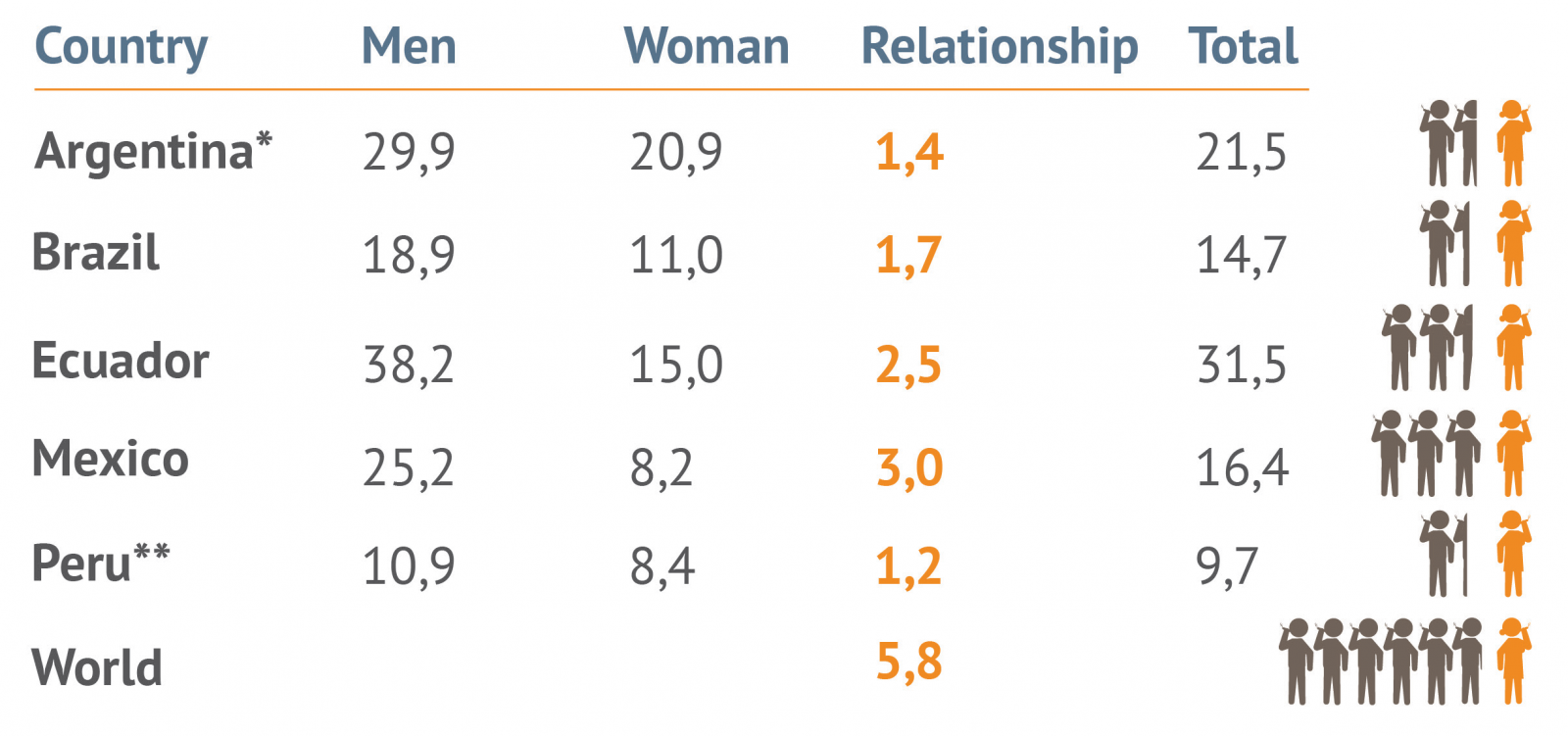- 26/03/2019
- Otros

The South American Network of Applied Economics / Red Sur presented the findings of its regional research Tobacco Taxes in Latin America* at the XXXI Regional Seminar on Fiscal Policy, organized by the Economic Commission for Latin America and the Caribbean (ECLAC)[1]. The research is based on in-depth studies in Argentina, Brazil, Ecuador, Mexico and Peru, where 263.000 people die annually due to tobacco related causes.** The studies were developed by fiscal experts of renowned research centers of the region, selected through an open call for papers launched by Red Sur and the University of Illinois Chicago (UIC) in November, 2017.
Research centers conducting national case studies:
- Centro iDeAS, Universidad Nacional de San Martín (UNSAM), Argentina
- Instituto Torcuato Di Tella (ITDT) – Red Sur
- Ethos, Laboratorio de Políticas Públicas – Mexico
- Centro de Investigación en Alimentación y Desarrollo (CIAD) – Mexico
- Instituto de Estudios Peruanos (IEP) – Peru
- Fundação Centro de Estudos do Comércio Exterior (FUNCEX) – Brazil
- Pontificia Universidad Católica del Ecuador (PUCE) – Ecuador
This project identified research gaps on tobacco taxation in each country. In doing so, the research contributes new evidence on the impact of ongoing and recent fiscal policy reforms, as well as reconversion policies and strategies to regulate the tobacco production chain, reduce tax evasion and avoidance.
Through different methodologies and approaches, the studies conclude that those tax increases that effectively increase final tobacco prices, can reduce tobacco consumption and generate increases in tax revenues.
Each national study makes recommendations to reform tax policies to be discussed and analyzed by the different stakeholders, which have an interest or responsibility in fiscal and health, or the promotion of policies towards healthier and more sustainable societies.
The impact of tobacco use is related not only to people’s health, but also to the states’ ability i) to prevent these diseases and respond with multidimensional policies to prevent and reduce consumption; ii) promote local tobacco producers reconversion; iii) adopt and implement effective measures to control or regulate the supply chain of tobacco products in order to prevent, discourage, detect, investigate and prosecute illicit trade in tobacco products; and iv) ensure full access to public health for those already suffering its effects.
The regional research project was coordinated by a team led by Oscar Cetrángolo (IIEP-UBA-CONICET/Red Sur) and Fernando Lorenzo (CINVE / Red Sur). Most of the estimates made by this project in the countries in the region agree that a 10% increase in the retail price results in a reduction of 4-5% in the amount consumed, obtaining a 5% tax revenue for the state. This research shows that the tax increase is consistent with the increase in the total revenue from tobacco taxes.
Falling tobacco consumption affects women more than in other parts of the world
The Red Sur report also describes the reduction in tobacco consumption in Latin America. Between 2007 and 2015, consumption in the Americas fell from 22.1% to 17.4%. In the cases of Argentina, Brazil and Peru, the pattern is the same as that usually observed worldwide, characterized by a concentration of the number of smokers in poorer sectors with lower educational levels, whereas Mexico and Ecuador are exceptions to this pattern.
Current consumption of smoked tobacco (%) in adults, unless otherwise stated:

Note: *Refers to current cigarette consumption (%) in adults.
Another finding from the study is that tobacco consumption affects a higher proportion of women in the region than the rest of the world. The rate of consumption among men in the region shows they are still a majority at 22% and women, 12%. This means that, at the regional level, there are 1.7 male smokers per female smoker, while in the rest of the world this figure rises to 5.8. In some cases, like Peru, consumption is very similar among young men and women (10.9% and 8.4%), while in others, such as Mexico, the percentage of men smoking is three times that of women, and in Ecuador it is two and a half times.
* This research was led by Red Sur within the Project, Accelerating Progress on Tobacco Taxation in Low- and Middle-Income Countries, by the “Tobacconomics” team at the Institute for Health Research and Policy of the University of Illinois, Chicago (UIC IHRP). UIC is a partner in the Bloomberg Initiative to Reduce Tobacco Use, which studies fiscal policy alternatives as an effective tool to reduce the levels of tobacco consumption and improve health. Academic coordination was under the responsibility of a Regional Technical Coordination team, led by Fernando Lorenzo (Centro de Investigaciones Económicas, CINVE/Red Sur) and Oscar Cetrángolo (Instituto Interdisciplinario de Economía Política de Buenos Aires, IIEP-UBA-CONICET/Red Sur), with the collaboration of Pedro Velasco (UBA/UNLP/Red Sur) and Carlos Grau (CINVE/Red Sur).
** Source: IECS, "Disease burden attributable to tobacco / Carga de enfermedad atribuible al tabaco", www.iecs.org.ar.
For additional project information, to coordinate interviews, please contact:
Julieta Piñeyro julieta@alva.com.uy +598 29169118
Fernanda Ariceta, Fernanda@alva.com.uy +598 94443483
**refers to current tobacco consumption (with and without smoke) (%) in young people
Source: Report on Tobacco Control in the Region of the Americas, 2018 - situation of tobacco control by country (http://iris.paho.org/xmlui/bitstream/handle/123456789/49237/9789275320150-spa.pdf?sequence=10&isAllowed=y)
[1] Live streaming in https://youtu.be/IavhEG_C4Ww)
Red Sudamericana de Economía Aplicada/Red Sur
South American Network on Applied Economics/Red Sur
Twitter @Red_mercosur
Facebook: @RedSudamericana.org
Linked-In: @Red Sudamericana de Economía Aplicada
